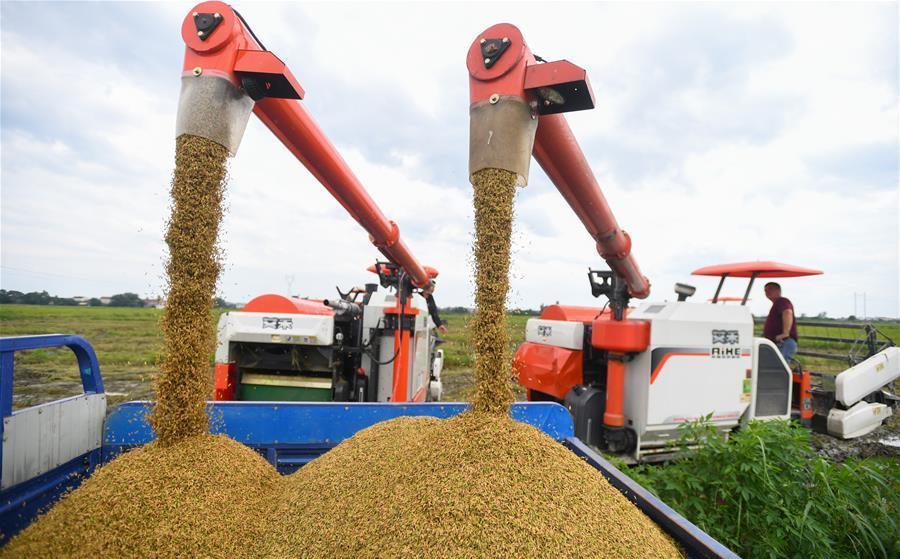Farmers load the harvested rice at Gangkou township in Yueyang county, Central China's Hunan province. PHOTO/XINHUA
Country's experience in reducing waste, increasing output shared around world
China's accumulated experience in reducing food loss and waste is being shared with the world and can help developing countries improve their ability to reduce food loss and ensure food security, experts and officials said.
About 14 percent of the world's food is lost during the processes from production to retail, and reducing that loss by 1 percentage point would be equal to a 28 million metric ton increase in grain output, which could feed 70 million people for a year, according to the State of Food and Agriculture 2019 report released by the United Nations Food and Agriculture Organization.
According to the FAO, over 155 million people experienced acute food insecurity in 2020, the highest number in the past five years, because of conflict, extreme weather events and economic shocks related to COVID-19.
Wu Laping, a professor at China Agricultural University's College of Economics and Management, said food loss and waste is largely affected by economic development, with developing countries losing food mainly before it is retailed and developed countries after retail.
For instance, food loss and waste mostly occurs in harvesting and storage in Africa and South Asia. Up to 30 percent of food loss was found during farmers' storage in some areas in Africa, and 21 percent of food in the United States was wasted during daily consumption, Wu told Economic Daily.
Compared with the world average, the food loss and waste situation in China is comparatively better. China loses 35 million tons of grain before retail each year, an amount roughly equal to the overall grain output of Sichuan province last year — 35.8 million tons.
China's experience shows that increasing grain output while reducing food loss and waste is a significant way to ensure national food security. In November, the country issued an action plan on saving food in multiple procedures to add "invisible" high-quality farmland.
Meanwhile, the reduction in loss and waste saves land, water, fertilizer and pesticides, and thus protects the environment and reduces carbon dioxide emissions, helping sustainable development.
"Because different countries face food loss and waste in different procedures, each country should find measures based on its situation," Wu said.
Lesser developed economies should focus on saving food during harvest and storage, which can be achieved by promoting varieties that can resist unfavorable conditions, such as weather and pests, and by improving modern agricultural machinery, high-quality storage and transportation equipment, he added.
China has made progress in saving food by promoting laws against food waste and action plans on saving food and reducing loss in the whole process from harvest to retail, Zhou Guanhua, of the National Food and Strategic Reserves Administration, said last month.
"We have built 5,400 postproduction service centers, covering 1,000 major grain-producing counties in the country, to provide services including cleaning, drying, storing, processing and retailing," Zhou said, adding that the daily drying capacity can reach 1.1 million tons.
The centers can greatly reduce food loss that occurs through poor storage facilities and limited drying ability after harvest, as some farmers in Northeast China still dry grain on the ground or pile it in their yards.
Innovation, technologies and infrastructure are critical to increasing the efficiency of food systems and to reducing food loss and waste.
Zhou said new technologies to better store grain have been applied in warehouses. "Large grain depots in the country can reduce the rate of grain loss during storage to less than 1 percent."
The special vehicles for bulk grain, devices for unloading grain trucks, and automatic scales have proved effective, he said.
'Healthy eating'
People's growing awareness of "healthy eating" instead of seeking out refined staple foods has gradually prompted processing companies to transition from overprocessing to moderate processing.
"China is developing key technologies and equipment for moderate processing to help solve the problem of nutrition loss and impaired protein function due to overprocessing."
In September, China hosted the International Conference on Food Loss and Waste in Shandong province. The recent food action plan proposes to make the conference a regular event.
Ma Youxiang, vice-minister of agriculture and rural affairs, said China would take the conference as an opportunity to promote establishing an international cooperation mechanism for reducing food loss and working together to boost world food security.
As the largest developing country, China has actively participated in global food and agriculture management, launching cooperative procedures in saving food with other countries.
Under the projects of the FAO, the World Food Programme and other international organizations, China shared information, techniques and talent with other countries, especially developing ones, to improve their ability to reduce food loss, Ma said.
Sui Pengfei, director of the ministry's department of international cooperation, said the country will strengthen its collaborative research and development of techniques and equipment applied to key procedures for saving food.
Find more audio news on the China Daily app.
记者:赵伊梦
播报:Corrie Knight
音频编辑:万月英
【背景阅读】
保障世界粮食安全的中国贡献
2021年10月16日是第41个世界粮食日。受新冠肺炎疫情、气候变化、地区冲突等多种因素影响,世界粮食安全面临严峻挑战。粮食安全是事关人类生存的根本性问题。作为世界人口最多的国家之一,中国为保障世界粮食安全采取有效行动,发挥积极作用。
“民以食为天”,历史上中国人长期受到粮食问题困扰。新中国成立后,中国人民依靠自己的力量实现了粮食基本自给。作为全球最大发展中国家,中国把中国人的饭碗牢牢端在自己手上,这样的伟大发展成就本身就为世界粮食安全作出重大贡献。联合国粮食峰会特使卡里巴塔说:“中国很好地管理好了自己的粮食库存,不仅保障了中国人民的粮食供给,也为世界人民的粮食安全作出了贡献。”柬埔寨官员埃塔说,中国成功保障自身粮食安全的做法,值得其他国家学习。
达则兼济天下。中国在实现粮食增收增产的同时,积极为推动世界实现零饥饿、零贫困目标贡献力量。在马达加斯加,中国提供的杂交水稻技术让很多当地人“再也没有饿过肚子”;在古巴,中国带去的“辣木”丰富了古巴人的“菜篮子”;在斐济,中国传授的菌草技术帮助农民减贫致富,让很多人看到生活的希望。中国政府2021年9月公布的数据显示,在作物生产、畜牧业水产养殖、农田水利、农产品加工等领域,中国向多个国家进行1500多项技术推广和示范,带动项目区平均增产40%至70%,超过150万户小农从中受益。在“一带一路”倡议沿线国家,中国推动农业对外投资合作,把当地的生产能力,特别是发展中国家的生产能力提高了很大一步。
同时,中国还推动国际社会加强政策协调,从全球层面提升粮农治理能力,推动各国在粮食减损、运输、检疫、进出口贸易等方面形成合理的国际规则,促进形成公平公正的国际粮食市场秩序。
近年来,中国在努力提高人民生活水平的同时,还大力弘扬浪费可耻、节约光荣之风,在减少食物损失和浪费方面的成效有目共睹。从2013年发起“光盘行动”到2021年颁布实施《反食品浪费法》,再到呼吁世界各国加快行动、切实减少世界粮食损耗,中国倡议和举措为进一步保障世界粮食安全提供了理念和经验借鉴。
维护粮食安全,中国与世界命运休戚与共。中国将继续与世界各国团结合作,为共同维护世界粮食安全作出不懈努力,为推动构建人类命运共同体作出新的贡献。(来源:新华社)
责任编辑:钱耐安






